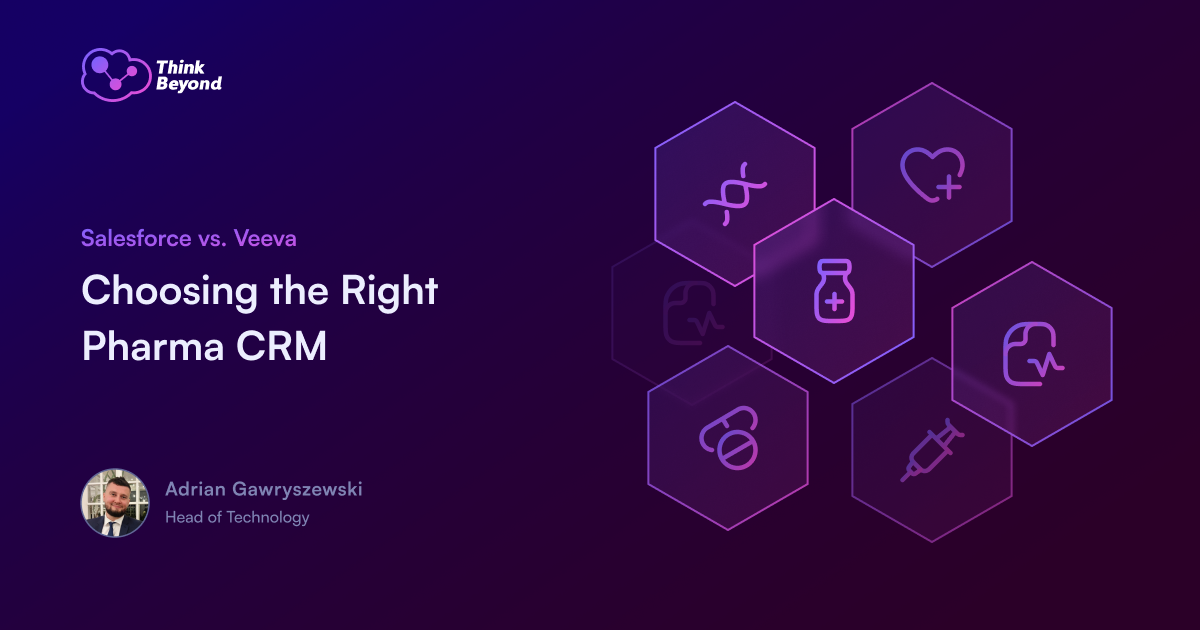The split between Veeva and Salesforce has reshaped the life sciences industry. Previously, these two companies worked together to provide CRM solutions for pharmaceutical businesses. Now, Veeva is focusing on promoting its own CRM platform, while Salesforce has strengthened its partnership with IQVIA to develop the Life Sciences Cloud.
Both companies are competing to deliver the best CRM solutions for the pharma sector. But what sets their offerings apart? Let’s take a closer look at their key features to help you choose the right pharma CRM software for your company.
Key Features of Salesforce Life Sciences Pharma CRM
Salesforce Pharma CRM builds upon Data Cloud and ensures security and compliance thanks to the Einstein Trust Layer. The platform focuses on key life sciences areas such as clinical research, commercial operations, and patient services, offering tools that enhance efficiency, collaboration, and engagement across the pharma value chain.

Patient Services
Salesforce makes patient support simple and effective by streamlining key processes:
- It offers tools for participant recruitment and enrollment, helping pharmaceutical companies identify and assess patients, simplify consent procedures, implement randomization, and provide self-service portals. These portals allow participants to register for trials and access screening instructions easily.
- The platform also supports advanced therapy management, covering everything from patient selection and treatment preparation to delivery and long-term monitoring. This ensures smooth collaboration across care teams, improving efficiency and care quality.
- Additionally, Salesforce enables personalized care programs that help identify potential adherence barriers early. By addressing these challenges, the CRM enhances patient outcomes and fosters better engagement throughout the patient treatment journey.
HCP Engagement
Healthcare professionals (HCPs)—including doctors, nurses, and physicians—are at the heart of the pharmaceutical industry. Engaging with this group effectively is crucial for pharma companies to build strong relationships and deliver value.
- Pharma CRM software from Salesforce offers a 360° HCP view of all interactions. This feature consolidates data from various touchpoints, creating a complete picture of each HCP’s preferences, behaviors, and history. By understanding these insights, sales teams can tailor their strategies and deliver more meaningful engagements.
- To strengthen relationships, the platform supports omnichannel communication across email, SMS, social media, in-person meetings, and virtual events. This flexibility allows HCPs to engage on their preferred channels while ensuring consistent messaging across all platforms.
- Salesforce simplifies the introduction of new therapies and devices to the market with its product catalog management tools. It supports both simple and complex product bundles, uses customizable templates for product classification, and provides HCPs with clear, organized information about new treatments or devices.
Communication
Pharma CRM software helps improve communication in the pharmaceutical industry, especially through call centers and patient surveys. These tools boost engagement and ensure compliance with regulatory standards.
- Call centers enable call tracking, intelligent routing, and shared inboxes to ensure patient inquiries reach the right agents or departments quickly. Agents have instant access to patient records, including past interactions and medical histories, allowing them to provide personalized and informed responses.
- CRMs also automate appointment or medication reminders, reducing no-shows and helping patients stay on track with their treatment plans. For more complex cases, built-in workflows guide agents on when and how to escalate issues, ensuring timely resolutions and improved patient satisfaction.
- Patient surveys are another area where CRMs excel. These systems make it easy to collect valuable feedback by sending surveys via email, SMS, or patient portals after key touchpoints such as appointments or the completion of treatments. The CRM aggregates survey responses to provide actionable insights into patient satisfaction, potential barriers to adherence, and areas for service improvement. Based on these insights, the system can trigger personalized follow-ups to address concerns or offer additional support. This feedback loop helps pharmaceutical companies better understand their audience and identify gaps in care delivery.
In addition to these features, CRM systems ensure that all communications comply with regulatory requirements like HIPAA by securely maintaining records of interactions.
Integrations with Ecosystem Tools
Salesforce integrates with other systems to create a unified ecosystem for pharmaceutical companies. These integrations are vital to modernize workflows and enhance business outcomes.
ERP and Inventory Systems
Integration with ERP systems bridges the gap between customer relationship management and enterprise resource planning, ensuring smooth data flow across departments. For example, sales teams can access real-time inventory levels or order statuses directly within Salesforce, enabling accurate quotes and timely delivery. Meanwhile, finance teams can monitor sales activities to align revenue forecasts with actual orders.
Medical and Regulatory Platforms
Salesforce integrates with medical and regulatory systems to simplify compliance tracking. Some tools leverage AI to automate quality management, document control, and regulatory compliance processes for standards such as FDA, EMA, and GMP. These integrations reduce the burden of manual workflows while ensuring adherence to evolving regulations.
Marketing Tools
Salesforce Marketing Cloud transforms pharmaceutical marketing by automating campaigns and enabling personalized engagement with HCPs and patients. It integrates to deliver consistent messaging across channels such as email, social media, and webinars. Advanced features include predictive analytics for drug launch success, chatbots for conversational marketing, and tailored email automation based on user behavior.
EHR Systems
Salesforce integrates with Electronic Health Records (EHRs) using tools like FHIR Connect to enable interoperability between clinical data systems. This integration creates a single source of truth for patient information by synchronizing medical histories, treatments, and billing data. Healthcare providers gain access to real-time insights that support personalized care plans and improve collaboration across teams.
By leveraging these integrations, Salesforce empowers companies to build a connected ecosystem that drives innovation while ensuring compliance and operational excellence. This makes Salesforce a strategic partner for pharma companies looking to transform their organizations.

Veeva Vault CRM in Pharmaceutical Operations
The Veeva CRM solution for the pharmaceutical industry is a comprehensive, cloud-based platform designed to enhance business outcomes across drug development, commercialization, and data management. It is particularly suited for life sciences companies seeking to improve operational efficiency, accelerate innovation, and drive customer-centric strategies. What are the key components and the business benefits that Veeva delivers through its pharma CRM software?
Veeva Development Cloud
This suite unifies applications for clinical, regulatory, and quality processes on a single platform. By eliminating silos across these functions, it offers features like:
- Streamlined workflows reduce time-to-market for new treatments.
- Centralized data ensures adherence to regulatory standards globally.
- Teams across regions can access a single source of truth, boosting productivity and alignment.
Veeva Commercial Cloud
This solution integrates sales, marketing, and medical teams to deliver seamless customer experiences. Key business outcomes include:
- Personalized interactions with healthcare professionals (HCPs) are enabled by AI-driven insights.
- Unified tools for campaign management, content delivery, and event planning improve agility in responding to market changes.
- Embedded analytics enhance segmentation and targeting, driving higher ROI on commercial efforts.
Veeva Data Cloud
This modern data platform provides accurate reference data, deep insights, and transaction data for life sciences organizations. The benefits:
- Connected data accelerates analytics and supports AI-driven initiatives.
- Eliminated redundancies in data management by integrating seamlessly with other Veeva solutions.
- Targeted interactions with key stakeholders through clean and actionable data.
By leveraging Veeva Data Cloud, organizations can streamline workflows and maximize the impact of their commercial strategies.

Key Business Benefits
Veeva’s cloud-based solutions grow with the needs of a pharmaceutical company. Its unified platform ensures consistency across geographies while adhering to local regulations. It fosters collaboration and innovation across all stages of the product lifecycle. And enhanced efficiency and precision in operations leads to better resource utilization and higher returns.
What to Consider When Selecting a Pharma CRM Software
The choice between Salesforce Life Sciences Cloud and Veeva Vault CRM depends on several key factors and should be aligned with the company’s goal and budget. Here are some things to consider when deciding which CRM for Pharma will be the best option:
Regulatory Compliance
Pharmaceutical companies operate in a highly regulated environment, requiring strict adherence to standards like HIPAA, GDPR, and GxP. Veeva Vault CRM is specifically designed for life sciences and offers built-in compliance with regulations such as 21 CFR Part 11 and the Prescription Drug Marketing Act (PDMA). Salesforce Life Sciences Cloud also supports compliance through tools like FHIR APIs and HIPAA-compliant data handling but may require additional customization for niche regulatory needs. For companies prioritizing regulatory alignment out-of-the-box, Veeva Vault CRM may have the edge.
Industry-Specific Features
Veeva Vault CRM is tailored exclusively for life sciences companies, offering specialized tools like medical information management, healthcare professional (HCP) engagement tracking, and marketing campaign efficiency monitoring. It integrates seamlessly with Veeva’s broader Vault ecosystem for clinical data management and regulatory workflows. Salesforce Life Sciences Cloud provides broader functionality that spans clinical trials, commercial operations, and patient services. Its flexibility allows companies to adapt features across different healthcare segments, making it ideal for organizations with diverse needs.
Advanced Analytics and Insights
Both platforms excel in analytics but differ in approach. Veeva Vault CRM leverages data science to provide targeted recommendations for sales teams and detailed dashboards on patient interactions. Salesforce Life Sciences Cloud integrates AI-powered tools like Einstein Analytics to deliver predictive insights on customer behavior, market trends, and operational efficiencies. Companies looking for cutting-edge AI capabilities might prefer Salesforce’s offerings.
Integration Capabilities
Salesforce Life Sciences Cloud benefits from Salesforce’s extensive ecosystem of third-party applications via AppExchange and integrates easily with systems like electronic health records (EHRs), billing platforms, and marketing tools. Veeva Vault CRM is part of the Veeva Vault suite, ensuring seamless integration with clinical and regulatory systems but offering less flexibility outside the life sciences domain. For companies needing broad integration across various industries or IT systems, Salesforce may be more adaptable.
Scalability and Customization
Salesforce Life Sciences Cloud is highly customizable and scalable, allowing companies to start small and expand as their business grows. Its modular design supports unique workflows across regions or departments. Veeva Vault CRM offers robust scalability within the life sciences sector but is less flexible for customization beyond predefined industry norms. This makes Salesforce a better choice for organizations seeking versatility across diverse operations.
Vendor Expertise
Veeva has over 17 years of experience exclusively serving the life sciences industry, making it a trusted partner for pharmaceutical companies like Moderna and Bayer. Salesforce brings cross-industry expertise from sectors like retail and finance while leveraging its partnership with IQVIA to deepen its focus on pharma-specific needs.

Ultimately, the decision depends on your company’s specific needs, existing technology stack, budget considerations, and long-term strategic goals in the rapidly evolving pharmaceutical landscape.
Innovation as the Key to Pharma Success
The pharmaceutical industry in 2025 faces transformative challenges that demand technological innovation:
- The shift toward personalized healthcare requires advanced tools like AI and genomic analytics to develop targeted therapies, improving patient outcomes while ensuring data privacy.
- Rising patient expectations push pharma companies to adopt digital health solutions, such as wearable devices and telemedicine platforms, to enhance engagement and transparency.
- The accelerated pace of innovation, driven by AI-assisted drug design and decentralized clinical trials, is reducing development timelines and costs, requiring companies to invest in cutting-edge technologies.
- A new model of healthcare provider engagement emphasizes personalized communication through omnichannel strategies and platforms like Salesforce Life Sciences Cloud.
Technology is central to addressing these challenges, enabling efficiency in drug discovery, improved patient adherence, and stronger HCP relationships. Development services further empower pharma companies to implement solutions tailored to their needs. By embracing AI, big data, and digital tools, pharma companies can stay competitive while delivering better care and outcomes globally.

